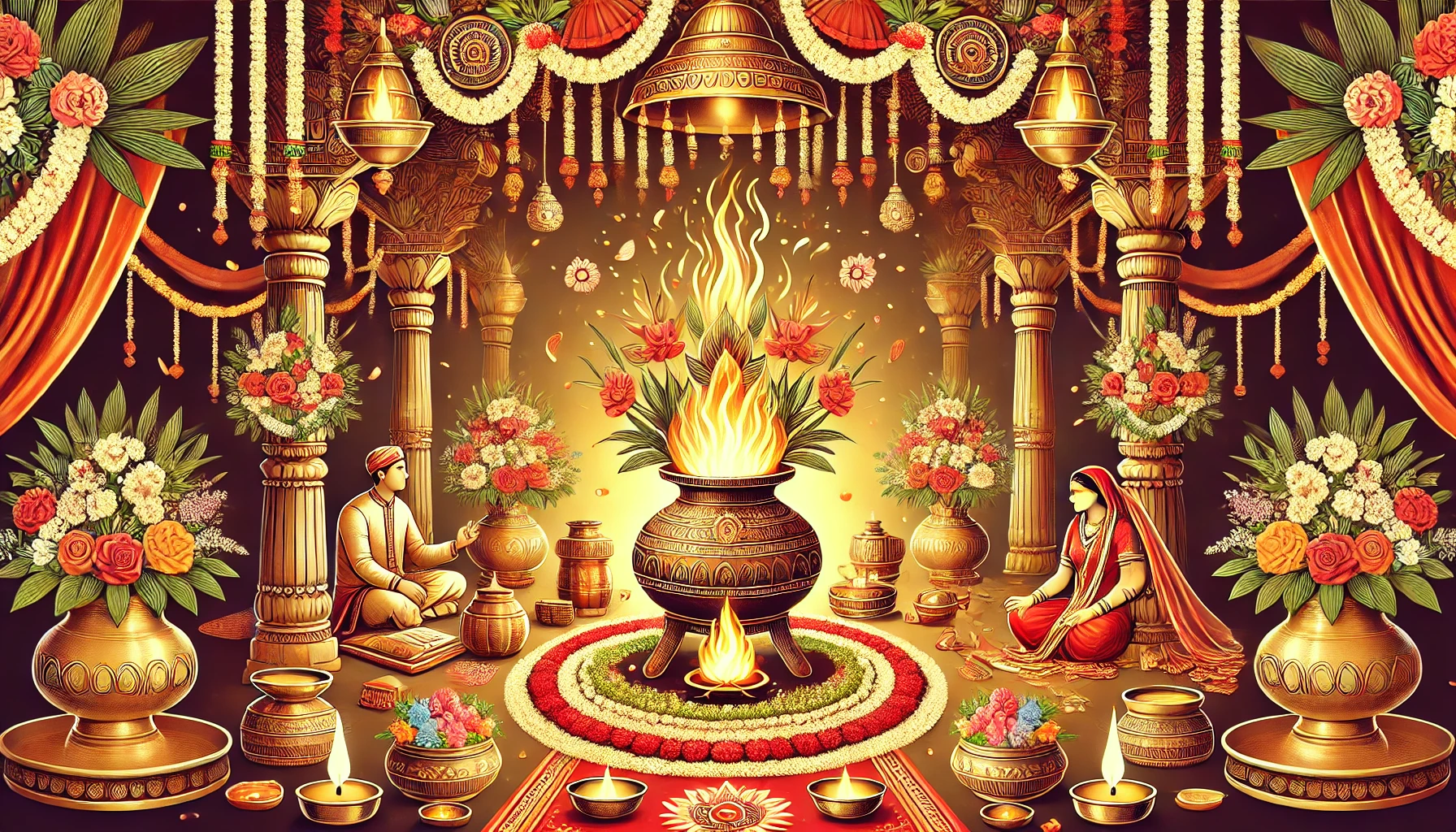Explore the profound role of Agni (sacred fire) in Hindu wedding rituals. Discover its spiritual significance, historical roots, and modern adaptations, symbolizing purity, unity, and divine blessings in the sacred union of marriage.

Hindu wedding ceremonies are rich in symbolism and deeply rooted in ancient traditions. Among the most revered and indispensable elements is the presence of Agni, the sacred fire. As the eternal witness to the union of two souls, Agni holds profound spiritual and cultural significance. In this article, we delve into the pivotal role of Agni in Hindu weddings, exploring its origins, symbolic meanings, and the way it shapes the sacred rites of matrimony.
Origins of Agni in Hindu Philosophy
Agni, the Sanskrit word for fire, is one of the most ancient and powerful deities in Hinduism. Revered as the messenger between humans and the divine, Agni occupies a central place in the Vedas, the oldest Hindu scriptures. In the Rigveda, Agni is described as the conduit through which offerings reach the gods. This vital role extends to Hindu wedding rituals, where the sacred fire becomes a spiritual medium connecting the couple, their families, and the divine forces.
According to the Vedic texts, Agni represents purity, energy, and transformation. It is believed that fire purifies everything it touches, making it an apt symbol for the sanctity of marriage. Through Agni, the couple’s vows are sanctified, and their union gains divine approval.
Significance of Agni in Hindu Weddings
The presence of Agni in Hindu wedding rituals goes beyond mere tradition. It serves as a cornerstone for the ceremony’s spiritual, emotional, and symbolic dimensions.
1. Purification and Sanctity
Fire is considered a purifier in Hinduism. During the wedding, Agni is invoked to cleanse the couple of past karmas, ensuring they embark on their marital journey with purity of mind and spirit.
2. Witness to Sacred Vows
Agni is often referred to as the “divine witness.” The couple takes their vows in its presence, reinforcing their commitment to one another. The sanctity of these promises is heightened by the belief that breaking them incurs divine disapproval.
3. Symbol of Energy and Transformation
Agni embodies energy and transformation. By participating in rituals involving fire, the couple symbolically commits to mutual growth and the transformation of their lives into one unified journey.
4. Spiritual Medium
Agni serves as a bridge between the earthly and the divine realms. Offerings made to the fire are believed to reach the gods, securing their blessings for the newlyweds.
Key Rituals Involving Agni
Agni is integral to several pivotal moments in a Hindu wedding. Below are the key rituals that underscore its importance:
1. Vivaha Homa
The Vivaha Homa, or sacred fire ritual, marks the start of the wedding ceremony. A fire is kindled in a havan kund (sacred fire pit) and maintained throughout the proceedings. Priests chant Vedic mantras, invoking blessings from deities for the couple’s harmonious life together.
2. Agni Pradakshina
Agni Pradakshina involves the bride and groom walking around the sacred fire, typically seven times. Each circumambulation represents a specific promise, such as mutual respect, shared prosperity, and enduring companionship.
3. Saptapadi
The Saptapadi, or seven steps, is performed around Agni. Each step corresponds to a vow, reinforcing the couple’s shared responsibilities. The fire bears witness to this sacred agreement, solidifying their union. Explore the significance of Saptapadi.
4. Offerings to Agni
Various offerings, such as ghee, grains, and sandalwood, are made to the fire. These offerings symbolize gratitude, prosperity, and a plea for divine blessings. The act of offering also reinforces the importance of selflessness in marriage.
Symbolism of Agni in Marriage
The sacred fire represents more than its physical form. Its flickering flames encapsulate profound philosophical and spiritual meanings:
- Eternal Witness: Agni symbolizes the eternal nature of the promises exchanged during the wedding.
- Divine Presence: The fire is a representation of the gods, ensuring their involvement in the ceremony.
- Unity: The flames signify the merging of two lives into one, much like the fusion of fire with the offerings it consumes.
- Illumination: Fire dispels darkness, symbolizing the clarity and wisdom that should guide the couple’s journey.
Scientific Insights into the Role of Fire
The use of fire in weddings also has practical and scientific implications:
- Purification: The smoke from the fire purifies the air, creating a sanitized environment.
- Health Benefits: Ingredients like ghee and herbs, when burned, release compounds that cleanse the atmosphere and enhance respiratory health.
- Focus and Presence: The hypnotic nature of flames draws attention and encourages mindfulness, ensuring that participants are fully present during the rituals.
Modern Adaptations of Agni Rituals
While the essence of Agni rituals remains intact, contemporary weddings have adapted these practices to align with modern sensibilities:
- Eco-Friendly Practices: Some families use smokeless havan kunds to reduce environmental impact.
- Simplified Ceremonies: Urban settings often necessitate shorter rituals without compromising the sanctity of the ceremony.
- Interfaith Weddings: Agni is incorporated creatively to respect diverse traditions while preserving its core symbolism.
Discover more about the evolution of Hindu wedding rituals.
Misconceptions Surrounding Agni Rituals
Despite their significance, some misconceptions about Agni rituals persist:
- Superstition vs. Symbolism: Critics view fire rituals as superstitious, failing to recognize their deeper spiritual and cultural meanings.
- Environmental Concerns: While traditional practices involved large fires, modern adaptations address ecological concerns without diluting their essence.
Practical Tips for Incorporating Agni in Weddings
- Educate Participants: Ensure the couple and their families understand the symbolic significance of Agni rituals.
- Personalize Rituals: Incorporate elements that resonate with the couple’s values and beliefs.
- Respect Tradition and Modernity: Strike a balance between adhering to tradition and embracing contemporary adaptations.
The sacred fire, Agni, is more than a ritualistic element in Hindu weddings. It is a beacon of spirituality, purity, and unity, embodying the essence of the sacred vows exchanged by the couple. By understanding and embracing its profound significance, couples can ensure their wedding ceremony becomes a timeless testament to their love, commitment, and shared values.
Author:
Aditya Chauhan – Temple Architect & Historian

